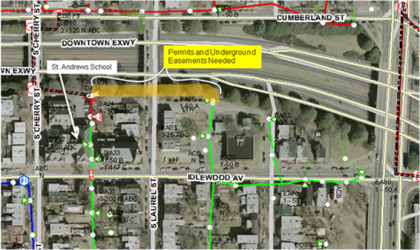Despite citizen hopes, the dream for high speed rail or even improved passenger rail service is faltering. It’s too bad, given the fact that before the devastation of the Civil War, Richmond was competing with New York City as a passenger rail center, and is famous for early light rail innovation.
The Times Dispatch feigns surprise, but CSX executives are quite blunt about being against passenger rail. From the linked Jacksonville Business Journal article:
“I’m a corporation. I exist to make money, OK?” Ward said. “You can’t make money hauling passengers, so why would I want to do that? That wouldn’t be fair to my shareholders.”
His comments come as CSX, the nation’s third-largest railroad, protests the State of New York’s plan to provide up to 110 mph passenger rail service between Albany and Buffalo. The Jacksonville-based railroads said the passenger trains will damage the track and cause service disruption to its freight trains.
So what is the future of transportation in Richmond?
On Wednesday, the Richmond First Club will host a panel discussion about this subject.
What can we expect?
More begging for the Richmond airport and ‘low-cost’ carriers?
Maybe more news on the BRT concept from GRTC?
At the same time, remember that Richmond is considered a test market for all sorts of advertising and new product launches. To that end, right now we see a new campaign for energy conservation sponsored by Shell Oil (perhaps part of a larger efforts, including the oxymoronic ‘clean coal’. Perhaps we will learn more about this on April 30 at the Science Museum. Green or greenwashing?
Richmond may also see more electric vehicles in the near future. In addition to the latest from STIR and Richmond Segway tours, I keep hearing rumors of electric car chargers in Broad Street garages with giant solar canopy arrays. While I share questions about the overall economic sustainability of electric cars, others are already cheering possible environmental advantages.
Personally, I am less critical and more celebratory about more electric bicycles in Richmond. They are much less expensive than cars and with pedal assist, are easily more energy efficient. Rumor is that Virginia Commonwealth University will be introducing Sanyo eneLoops for its police in order to enforce parking regulations. This, plus Richmond Bike Week, immediately improves the mood.
The new MegaBuses offer a glimmer of hope as well, increasing routes and perhaps doing what government could not by supplying a transfer station in Shockoe Bottom.
Still, at the very least, hopefully the members of the Richmond First Club will recognize that coal, and specifically CSX coal trains, are holding back passenger rail transportation. Mitigate the coal trade, clean up Acca train yard, and let passenger rail work. As I have expressed before, Richmond sits on a Gordian knot that includes strands of energy and transportation policies and must be loosened at all ends before real progress can be made. Sadly, locally as well as nationally, corporations and their demand for short-term profits seem to have a lock hold on those policies and any long term thinking that would benefit country or citizens.



